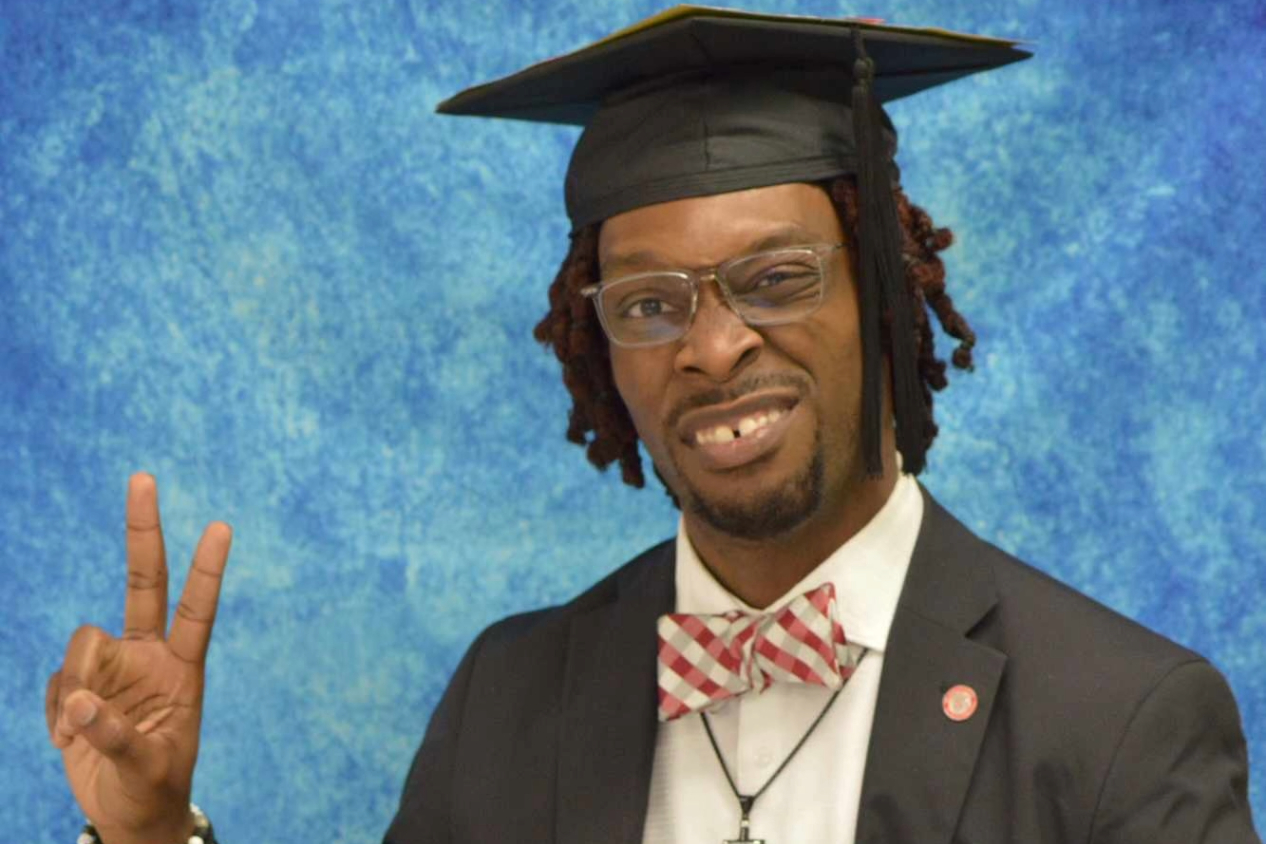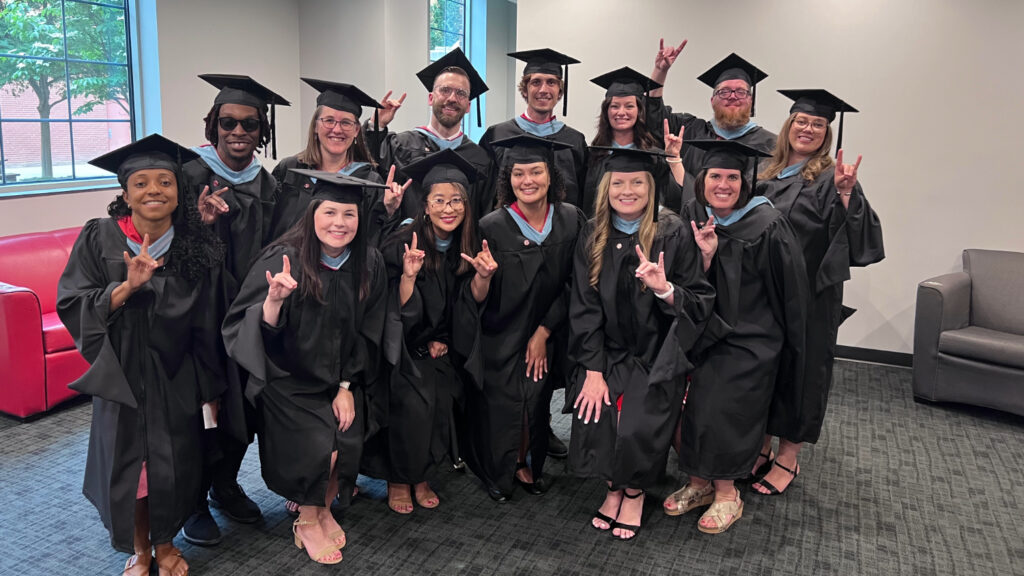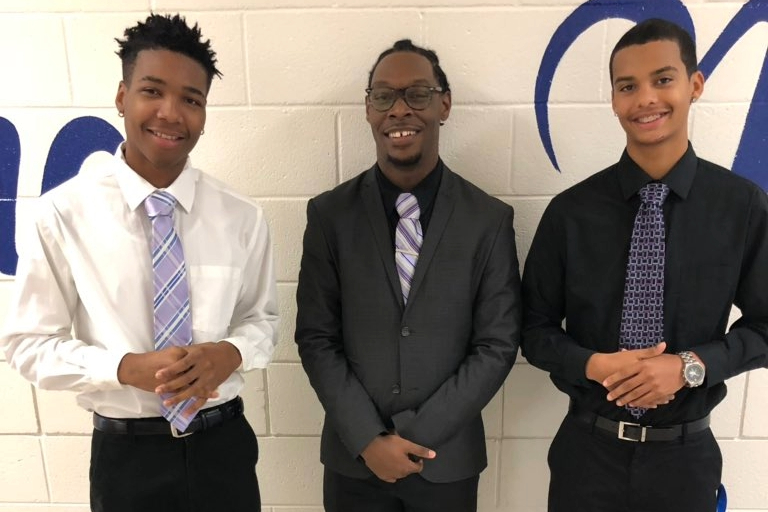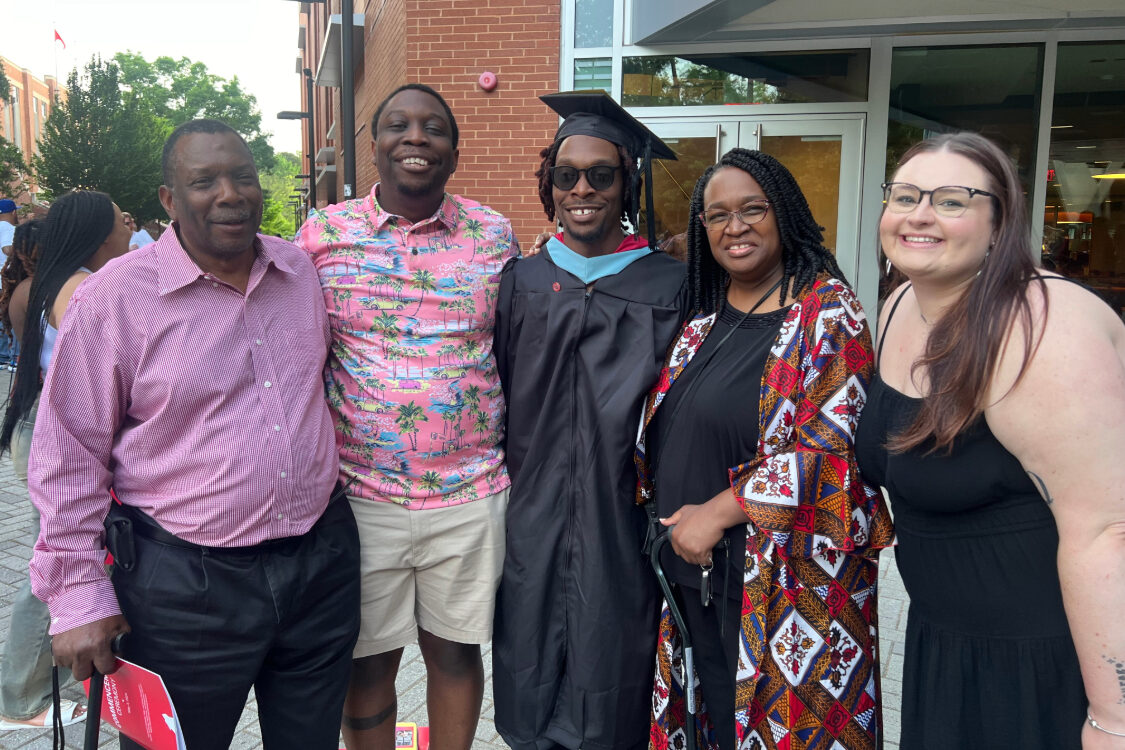An Unforgettable Adventure: Meet Reginald Simon, MSA ‘24

Educator Reginald Simon is genuinely passionate about developing the leadership potential and self-esteem of the young people he teaches, mentors, advises and coaches.
As an early-career language arts teacher and athletic coach for public middle and high school students, Simon quickly realized his own potential for fueling the fires of student success through leadership and student advocacy.
But to attain the comprehensive leadership development he would need to be an effective school leader, he had to go back to school.
Already working full time as an English Language Arts (ELA) teacher at Westover High School in Fayetteville, he sought a high-quality online opportunity that would prepare him for the educational leadership role he was destined for.
He found that opportunity at NC State’s Educational Leadership Academy (NELA), a highly selective online graduate program through the College of Education designed to develop school leaders for districts in rural eastern North Carolina.
“I enrolled into the NELA program because I believe I am an agent of change,” Simon said. “With NELA being the top principal preparation program in the state, I knew that it would prepare me to create positive change in the schools I serve.”
The curriculum and residency experiences at NELA endeavor to prepare and retain principals and other school leaders in and for high-poverty, hard-to-staff and historically low-performing schools.
This month, Simon received his NC State Master of School Administration (MSA) degree through NELA. He is wrapping up his 10-month Principal Residency at South View Middle School in Hope Mills, NC, and feels ready to positively impact student learning outcomes in whatever role his future holds.
“I am leaving the program with practical strategies to positively influence any school I’ll serve,” he said. “These past two years have been an unforgettable adventure.”
Building Meaningful Relationships
Simon began teaching ELA at Westover High School soon after graduating from North Carolina Central University, where he studied Mass Communications. While he was teaching, Simon completed requirements at Fayetteville State University to receive his North Carolina educator’s license through a lateral entry program.
He was recognized several times as “Beginning Teacher of the Month” and was nominated for the school’s “Beginning Teacher of the Year” award in 2021. He was also selected to participate in a county-wide professional development (PD) highlighting hybrid learning strategies. This PD served as the foundation for Cumberland County’s adjustment to the COVID-19 pandemic.
After transitioning to John Griffin Middle School, where he taught 7th grade ELA, Simon took on the job of head baseball coach and athletic trainer for winter sports. He loved building relationships with the student athletes and seeing them thrive.
“Taking the time to relate and connect with students creates a school culture built on trust, coherence and accountability,” he explained.
As well as connecting with students, Simon deeply values building meaningful relationships with school stakeholders including parents, staff, leadership and the community.
“School administrators have the ability to ignite or extinguish the natural fire for education burning within all school stakeholders,” he said. “By creating strong professional relationships, I hope to fuel that fire within the school community.”

NELA’s data bear out the effects of stakeholder engagement on student learning and staff retention: At middle and high schools with a NELA graduate as principal or vice principal, there are fewer student suspensions and other discipline incidents and noteworthy increases in attendance.
With seven leadership academies and several consortium cohorts across the state, NELA programs serve nearly a quarter of North Carolina’s public schools — some 270,000 students, according to this NC State video about principal preparation. Since the first cohort graduated in 2012, 140 principals, assistant principals and other school leaders have joined school districts in North Carolina and beyond.
Leading with Empathy
Simon began the NELA MSA program in 2022 as part of the Southern Fellows 2024 cohort. He is based in Cumberland County, where he teaches and lives. Although the program is fully online — which was compounded by the limitations of the COVID-19 pandemic in that first year of classes — Simon still managed to develop meaningful and collaborative relationships with his peers.
“I’m grateful for the gift of my cohort members,” he explained. “They were pillars of support for me during my journey as a graduate student and as a developing school leader.”
It was also during these formative teaching years that Simon founded and served as head mentor for the Brotherhood of Successful Students (BOSS) mentoring program for the high school boys of Westover High School. His passion for mentorship continued through his principal residency at South View Middle School, where he founded the Brotherhood of Leadership and Distinction (BOLD) mentoring program.
“Mentorship has always been at the center of my passion for education,” Simon said.

Geared toward potentially at-risk youths, the BOLD initiative seeks to build community and bolster the young men’s confidence through the development of social and leadership skills while modeling healthy ways to resolve conflicts and manage powerful emotions.
“Reginald is a passionate school leader,” said Teresa Pierrie, Cumberland County Cohort Director for the NELA Principal Preparation program. “He navigated the demands of the online MSA while building an impactful mentoring program for middle school young men.”
In fact, the BOLD mentor program received a special grant through NELA to support its ongoing development.
“During a recent school visit to observe Reginald,” continued Pierrie, “I witnessed firsthand the impact he has made with his program and the respect the students have for him as a school leader and a mentor. He is impressive.”
As a Cumberland County Schools graduate, Simon understands the importance of having committed role models and community-engaged programming that offers students opportunities for exploring their identities, values and beliefs.
“One takeaway from the experience I’ll hold dear to my heart is leading with empathy,” he said. “I hope to always be an active advocate for students both within and outside of the classroom.”
Pushing Toward Greatness
Simon credits his various communities for supporting him through his graduate program: his educator peers and work colleagues, his family and friends, and his faith community. In addition to serving as a school leader, Simon is a minister and youth adviser for his church in Fayetteville.
“Leaning on God for the strength I needed to see the program through, alongside prayer and sacrifice, aided me the most,” he said.

He finds time for self-care through singing, writing poetry, gaming and spending time with his family. Simon also enjoys attending plays, ballets, musicals and concerts of all types.
As a non-traditional student returning to college after several years away, Simon had to relearn some of the skills needed for academic success: “The rigorous coursework challenged my writing and creative skills,” he said. “My professors challenged and encouraged me to become a transformational school leader.”
Among the faculty most influential to Simon was Bill Harrison, who was the Superintendent of Cumberland County Schools when Simon was growing up, and who is currently Interim Superintendent of Alamance-Burlington Schools.
“Having Dr. Harrison as a professor was a full circle moment for me,” Simon said. “His wisdom and relatable personality motivates me to be the best version of myself.”
Simon also recognizes faculty members Timothy Drake for inspiring life-changing classroom discussions and Eddie Price for generously sharing his engaging and insightful knowledge.
“I appreciate all of the professors for pushing me toward greatness,” he said, “and never allowing me to be mediocre.”
Simon encourages professional educators considering the online MSA degree to enroll in the program. “Although my journey was intense, I gained a wealth of knowledge, skills and resources to increase my effectiveness as an educator and leader,” he said.
“An online program can be difficult,” he continued, “but with dedication, focus, and a support system in place, you will conquer it.”
Want to serve your community in an educational leadership role? Learn more about NC State’s online Principal Preparation program.
- Categories:


